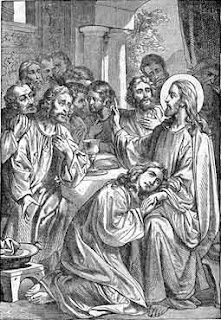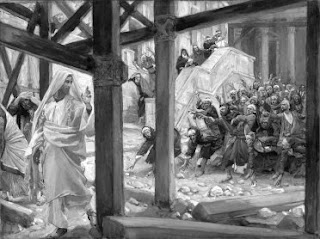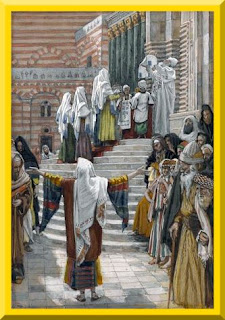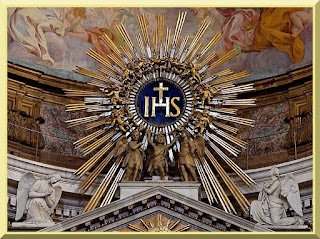INSTRUCTION
ON HOLY THURSDAY
What
festival
does the Church celebrate today?
The
Catholic Church commemorates today the institution, by our Saviour,
of the Holy Sacrifice of the Mass, and the Most Blessed Sacrament of
the Altar. This commemoration she has celebrated from the first ages
of Christianity.
What
remarkable things did Christ perform on this day?
He
ate with His apostles the Paschal lamb which was a type of Himself;
it was eaten with bitter herbs and unleavened bread; they ate it
standing with clothes girded, and staff in hand, in remembrance of
the hurried escape of the Jews from Egypt. (Exodus 12) After having
eaten the Paschal lamb, Our Lord with profound humility washed the
feet of His apostles, exhorting them to practise the same humility
and charity; afterwards, He gave them His Flesh and Blood under the
appearance of bread and wine, for spiritual food and drink, thus
instituting the Most Holy Sacrament of the Altar, the Sacrifice of
the Mass, and the priesthood; for when He said to the apostles: Do
this in commemoration of me, he ordained them priests. After this He
held His last discourse in which He particularly recommended
brotherly love; said that beautiful, high-priestly prayer, in which
He implored His Heavenly Father particularly for the unity of His
Church. He then went as usual to Mount Olivet, where He commenced His
passion with prayer and resignation to the will of His Father,
suffering intense, deathlike agony, which was so great that He sweat
blood. Here Judas betrayed Him into the hands of the Jews, by a
treacherous kiss. They bound Him and led Him to the high-priests,
Annas and Caiphas, where He was sentenced to death by the council,
and denied by Peter.
The
Introit of the Mass reads thus: We ought to glory in the cross of our
Lord Jesus Christ: in whom is our salvation, life, and resurrection:
by whom we have been saved and delivered. (Galatians 6:I4) May God
have mercy on us, and bless us: may He cause the light of His
countenance to shine upon us, and may He have mercy on us. (Psalms
66:2)
COLLECT
O God! from whom Judas received the punishment of his sin, and
the thief the reward of his confession: grant us the effects of Thy
mercy; that as our Lord Jesus Christ at the time of His passion
bestowed on each a different recompense of his merits, so having
destroyed the old man in us, He may give us the grace of His
Resurrection. Who liveth, etc.
What
ceremonies are observed in this day's Mass?
The
crucifix is covered with a white veil in memory of the sacred
institution of the Blessed Sacrament of the Altar. The priest comes
to the altar robed in white vestments; the Gloria in excelsis is
solemnly sung, accompanied by the ringing of bells, and all
Christians are exhorted to render praise and gratitude to the Lord
for having instituted the Blessed Feast of Love; after the Gloria the
bells are silent until Holy Saturday to indicate the Church's
mourning for the passion and death of Jesus; to urge us also to spend
these days in silent sorrow, meditating on the sufferings of Christ,
and in memory of the shameful flight of the apostles at the capture
of their master, and their silence during these days. At the Mass the
priest consecrates two hosts one of which He consumes at the
Communion, and the other he preserves in the chalice for the
following day, because no consecration takes place on Good Friday.
The officiating priest does not give the usual kiss of peace before
Communion, because on this day Judas betrayed his master with a kiss.
After Mass, the consecrated host in the chalice, and the Blessed
Sacrament in the tabernacle, are taken in procession to the sacristy
or repository, in memory of the earliest times of Christianity, when
the consecrated hosts for the communicants and the sick, were kept in
a place especially prepared, because there was no tabernacle on the
altar. Moreover it also signifies Christ's going to Mount Olivet,
where His Godhead was concealed. After the procession the priests
with the choir say vespers in adoration of the Blessed Sacrament.
EPISTLE
(I Corinthians 11:20-32.) Brethren, When you come together
into one place, it is not now to eat the Lord's supper. For every one
taketh before his supper to eat. And one indeed is hungry, and
another is drunk. What! have you not houses to eat and drink in? Or
despise ye the Church of God? and put them to shame that have not?
What shall I say to you? Do I praise you? In this I praise you not.
For I have received of the Lord that which also. I delivered to you:
that the Lord Jesus, the same night in which he was betrayed, took
bread, and giving thanks, broke it, and said: Take ye, and eat: this
is my body, which shall be delivered for you: this do for the
commemoration of me. In like manner also, the Chalice, after, he had
supped, saying: This Chalice is the New Testament in my blood. This
do ye, as often as you shall drink it, for the commemoration of me.
For as often as you shall eat this bread, and drink this chalice, you
shall show the death of the Lord, until he come. Wherefore, whoever
shall eat this bread, or drink the chalice of the Lord unworthily,
shall be guilty of the body and of the blood of the Lord. But let a
man prove himself, and so let him eat of that bread, and drink of the
chalice. For he that eateth and drinketh unworthily, eateth and
drinketh judgment to himself, not discerning the body of the Lord.
Therefore are there many infirm and weak among you, and many sleep.
But if we would judge ourselves, we should not be judged. But whilst
we are judged, we are chastised by the Lord, that we be not condemned
with this world.
EXPLANATION
The early Christians were accustomed after the celebration of the
Lord's Supper, to unite in a common repast; those who were able
furnished the food, and rich and poor partook of it in common, in
token of brotherly love. This repast they called "Agape,”
“meal of love.” At Corinth this custom was abused, some ate
before Communion that which had been brought, became intoxicated, and
deprived the poor of their share. The Apostle condemns this abuse,
declaring it an unworthy preparation for Communion, and reminds the
Corinthians of the institution of the Blessed Sacrament telling them
what a terrible sin it is to partake of the body and blood of the
Lord unworthily, for whoever does this makes himself guilty of the
body and blood of the Lord, and eats and drinks his own judgment,
that is, eternal damnation. Therefore prove yourself, O Christian
soul, as often as you communicate, see whether you have committed any
grievous sin which you have not confessed, or for which you were not
heartily sorry.
GOSPEL
(John 13:1-15.) Before the festival day of the Pasch, Jesus
knowing that his hour was come, that he should pass out of this world
to the Father: having loved, his own who were in the world, he loved
them to the end. And when supper was done, the devil having now put
into the heart of Judas, the son of Simon Iscariot, to betray him:
knowing that the Father had given him all things into his hands, and
that he came from God, and goeth to God: he riseth from supper, and
layeth aside his garments: and having taken a towel, he girded
himself. After that, he poureth water into a basin, and began to wash
the feet of the disciples, and to wipe them with the towel, wherewith
he was girt. He cometh therefore to Simon Peter, and Peter saith to
him: Lord, dost thou wash my feet? Jesus answered, and said to him:
What I do, thou knowest not now, but thou shalt know hereafter. Peter
saith to him: Thou, shalt never wash my feet. Jesus answered him: If
I wash thee, not, thou shalt have no part with me. Simon Peter with
to him: Lord! not only my feet, but also my hands and my head. Jesus
saith to him: He that is washed, needeth not but to wash his feet,
but is clean wholly. And you are clean, but not all. For he knew who
he was that would betray him: therefore he said: You are not all
clean. Then after he had washed their feet, and taken his garments,
being set down again, he said to them: Know you what I have done to
you? You call me Master, and Lord: and you say well, for so I am. If
then I, being your Lord and Master, have washed your feet, you also
ought to wash one another's feet. For I have given you an example
that as I have done to you so do you also.
Why
did Jesus wash the feet of His disciples?
To
give them a proof of His sincere love and great humility which they
should imitate; to teach them that although free from sin, and not
unworthy to receive His most holy body and blood, their feet needed
cleansing, that is, that they should be purified from all evil
inclinations which defile the heart, and prevent holy Communion from
producing fruitful effects in the soul.
Why
is it that on this day in each church only one priest says Mass at
which the others receive Communion?
Because
on this day Christ alone offered the unbloody Sacrifice, and having
instituted the Blessed Sacrament, fed with His own hands His
disciples with His flesh and blood, it is therefore proper that in
commemoration of this, the priests in one church should receive the
Blessed Sacrament from the hands of one, according to the example of
the apostles, but as a sign of the priestly dignity which on this day
Christ gave to the apostles and their successors, each priest wears a
stole.
Why
art the altars
stripped on this day?
To
show that Jesus took off, as it were, at the time of His passion, His
divine glory, and yielded Himself up in utter humiliation into the
hands of His enemies to be crucified, (Phil. II. 6. 7.) and that at
the crucifixion He was forcibly stripped of His garments, which the
soldiers divided among them, as foretold in the twenty-first psalm,
which is therefore said during this ceremony. The faithful are urged
to put off the old sinful man with his actions, and by humbling
themselves become conformable to Christ.
Why
is it that spiritual superiors wash the feet of their subjects, as do
also the Catholic princes the feet of twelve poor men?
To
commemorate the washing of the apostles' feet by Christ, and to teach
all, even the highest to exercise the necessary virtues of humility
and charity towards all, even the lowest, according to the example
given by Jesus. Princes and spiritual superiors therefore kiss the
feet after washing them, and the pope presses them to his breast,
giving to each person a silver and a gold medal, on which is pictured
the washing of the feet by Christ.
How
should we attend the Church service on this day?
The
Church commemorates on this day the institution of the Most Blessed
Sacrament of the Altar; we should therefore consider with a lively
faith that Jesus, our divine Teacher and Saviour, is really and truly
here present; we should adore Him as the Son of God, who became man
to redeem us; should admire the love which determined Him to
institute the Blessed Sacrament, that He might always be with us; and
should thank Him for all the inestimable graces which we derive from
this Sacrament.
REMARK
In the Cathedrals the holy oils which are used in Baptism,
Conformation, Holy Orders, and Extreme Unction, as also in
consecrating baptismal fonts and altar stones, are blessed on this
day. Let us thank Our Lard for the institution of these Sacraments at
which blessed oils are used.
–
Goffine’s
Devout Instructions





